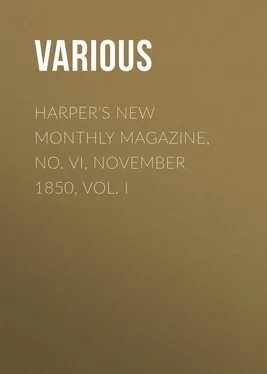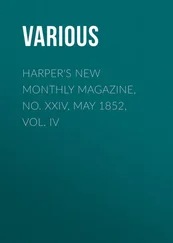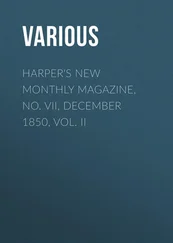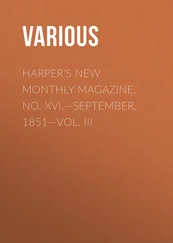Various - Harper's New Monthly Magazine, No. VI, November 1850, Vol. I
Здесь есть возможность читать онлайн «Various - Harper's New Monthly Magazine, No. VI, November 1850, Vol. I» — ознакомительный отрывок электронной книги совершенно бесплатно, а после прочтения отрывка купить полную версию. В некоторых случаях можно слушать аудио, скачать через торрент в формате fb2 и присутствует краткое содержание. Издательство: Иностранный паблик, Жанр: periodic, foreign_edu, на английском языке. Описание произведения, (предисловие) а так же отзывы посетителей доступны на портале библиотеки ЛибКат.
- Название:Harper's New Monthly Magazine, No. VI, November 1850, Vol. I
- Автор:
- Издательство:Иностранный паблик
- Жанр:
- Год:неизвестен
- ISBN:нет данных
- Рейтинг книги:5 / 5. Голосов: 1
-
Избранное:Добавить в избранное
- Отзывы:
-
Ваша оценка:
- 100
- 1
- 2
- 3
- 4
- 5
Harper's New Monthly Magazine, No. VI, November 1850, Vol. I: краткое содержание, описание и аннотация
Предлагаем к чтению аннотацию, описание, краткое содержание или предисловие (зависит от того, что написал сам автор книги «Harper's New Monthly Magazine, No. VI, November 1850, Vol. I»). Если вы не нашли необходимую информацию о книге — напишите в комментариях, мы постараемся отыскать её.
Harper's New Monthly Magazine, No. VI, November 1850, Vol. I — читать онлайн ознакомительный отрывок
Ниже представлен текст книги, разбитый по страницам. Система сохранения места последней прочитанной страницы, позволяет с удобством читать онлайн бесплатно книгу «Harper's New Monthly Magazine, No. VI, November 1850, Vol. I», без необходимости каждый раз заново искать на чём Вы остановились. Поставьте закладку, и сможете в любой момент перейти на страницу, на которой закончили чтение.
Интервал:
Закладка:
After making the drawings here given, I visited and made the sketch of "Clark's House." There I found a remarkably intelligent old lady, Mrs. Margaret Chandler, aged eighty-three years. She has been an occupant of the house, I believe, ever since the Revolution, and has a perfect recollection of the events of the period. Her version of the escape of Hancock and Adams is a little different from the published accounts. She says that on the evening of the 18th of April, 1775, some British officers, who had been informed where these patriots were, came to Lexington, and inquired of a woman whom they met, for "Mr. Clark's house." She pointed to the parsonage; but in a moment, suspecting their design, she called to them and inquired if it was Clark's tavern that they were in search of. Uninformed whether it was a tavern or a parsonage where their intended victims were staying, and supposing the former to be the most likely place, the officers replied, "Yes, Clark's tavern." "Oh," she said, "Clark's tavern is in that direction," pointing toward East Lexington. As soon as they departed, the woman hastened to inform the patriots of their danger, and they immediately arose and fled to Woburn. Dorothy Quincy, the intended wife of Hancock, who was at Mr. Clark's, accompanied them in their flight.
I next called upon the venerable Abijah Harrington, who was living in the village. He was a lad of fourteen at the time of the engagement. Two of his brothers were among the minute men, but escaped unhurt. Jonathan and Caleb Harrington, near relatives, were killed. The former was shot in front of his own house, while his wife stood at the window in an agony of alarm. She saw her husband fall, and then start up, the blood gushing from his breast. He stretched out his arms toward her, and then fell again. Upon his hands and knees he crawled toward his dwelling, and expired just as his wife reached him. Caleb Harrington was shot while running from the meeting-house. My informant saw almost the whole of the battle, having been sent by his mother to go near enough, and be safe, to obtain and convey to her information respecting her other sons, who were with the minute men. His relation of the incidents of the morning was substantially such as history has recorded. He dwelt upon the subject with apparent delight, for his memory of the scenes of his early years, around which cluster so much of patriotism and glory, was clear and full. I would gladly have listened until twilight to the voice of such experience, but time was precious, and I hastened to East Lexington, to visit his cousin, Jonathan Harrington, an old man of ninety, who played the fife when the minute men were marshaled on the Green upon that memorable April morning. He was splitting fire-wood in his yard with a vigorous hand when I rode up; and as he sat in his rocking-chair, while I sketched his placid features, he appeared no older than a man of seventy. His brother, aged eighty-eight, came in before my sketch was finished, and I could not but gaze with wonder upon these strong old men, children of one mother, who were almost grown to manhood when the first battle of our Revolution occurred! Frugality and temperance, co-operating with industry, a cheerful temper, and a good constitution, have lengthened their days, and made their protracted years hopeful and happy. 4 4 The seventy-fifth anniversary of the battles of Lexington and Concord was celebrated at the latter place on the 19th of April, 1850. In the procession was a carriage containing these venerable brothers, aged, respectively, nearly ninety-one and ninety-three; Amos Baker, of Lincoln, aged ninety-four; Thomas Hill, of Danvers, aged ninety-two; and Dr. Preston, of Billerica, aged eighty-eight. The Honorable Edward Everett, among others, made a speech on the occasion, in which he very happily remarked, that "it pleased his heart to see those venerable men beside him; and he was very much pleased to assist Mr. Jonathan Harrington to put on his top coat a few minutes ago. In doing so, he was ready to say, with the eminent man of old, 'Very pleasant art thou to me, my brother Jonathan!'"
The aged fifer apologized for the rough appearance of his signature, which he kindly wrote for me, and charged the tremulous motion of his hand to his labor with the ax. How tenaciously we cling even to the appearance of vigor, when the whole frame is tottering to its fall! Mr. Harrington opened the ball of the Revolution with the shrill war-notes of the fife, and then retired from the arena. He was not a soldier in the war, nor has his life, passed in the quietude of rural pursuits, been distinguished except by the glorious acts which constitute the sum of the achievements of a GOOD CITIZEN.
I left Lexington at about three o'clock, and arrived at Cambridge at half past four. It was a lovely autumnal afternoon. The trees and fields were still green, for the frost had not yet been busy with their foliage and blades. The road is Macadamized the whole distance; and so thickly is it lined with houses, that the village of East Lexington and Old Cambridge seem to embrace each other in close union.
Cambridge is an old town, the first settlement there having been planted in 1631, contemporaneous with that of Boston. It was the original intention of the settlers to make it the metropolis of Massachusetts, and Governor Winthrop commenced the erection of his dwelling there. It was called New Town, and in 1632 was palisaded. The Reverend Mr. Hooker, one of the earliest settlers of Connecticut, was the first minister in Cambridge. In 1636, the General Court provided for the erection of a public school in New Town, and appropriated two thousand dollars for that purpose. In 1638, the Reverend John Harvard, of Charlestown, endowed the school with about four thousand dollars. This endowment enabled them to exalt the academy into a college, and it was called Harvard University in honor of its principal benefactor.
Cambridge has the distinction of being the place where the first printing-press in America was established. Its proprietor was named Day, and the capital that purchased the materials was furnished by the Rev. Mr. Glover. The first thing printed was the "Freeman's Oath," in 1636; the next was an almanac; and the next the Psalms, in metre. 5 5 Records of Harvard College.
Old Cambridge (West Cambridge, or Metonomy, of the Revolution), the seat of the University, is three miles from West Boston Bridge, which connects Cambridge with Boston. Cambridgeport is about half way between Old Cambridge and the bridge, and East Cambridge occupies Lechmere's Point, a promontory fortified during the siege of Boston in 1775.
Arrived at Old Cambridge, I parted company with the vehicle and driver that conveyed me from Concord to Lexington, and hither; and, as the day was fast declining, I hastened to sketch the head-quarters of Washington, an elegant and spacious edifice, standing in the midst of shrubbery and stately elms, a little distance from the street, once the highway from Harvard University to Waltham. At this mansion, and at Winter Hill, Washington passed most of his time, after taking command of the Continental army, until the evacuation of Boston in the following spring. Its present owner is Henry Wadsworth Longfellow, Professor of Oriental languages in Harvard University, and widely known in the world of literature as one of the most gifted men of the age. It is a spot worthy of the residence of an American bard so endowed, for the associations which hallow it are linked with the noblest themes that ever awakened the inspiration of a child of song.
"When the hours of Day are number'd
And the voices of the Night
Wake the better soul that slumber'd
To a holy, calm delight,
Ere the evening lamps are lighted,
And, like phantoms grim and tall,
Shadows from the fitful fire-light
Dance upon the parlor wall,"
Интервал:
Закладка:
Похожие книги на «Harper's New Monthly Magazine, No. VI, November 1850, Vol. I»
Представляем Вашему вниманию похожие книги на «Harper's New Monthly Magazine, No. VI, November 1850, Vol. I» списком для выбора. Мы отобрали схожую по названию и смыслу литературу в надежде предоставить читателям больше вариантов отыскать новые, интересные, ещё непрочитанные произведения.
Обсуждение, отзывы о книге «Harper's New Monthly Magazine, No. VI, November 1850, Vol. I» и просто собственные мнения читателей. Оставьте ваши комментарии, напишите, что Вы думаете о произведении, его смысле или главных героях. Укажите что конкретно понравилось, а что нет, и почему Вы так считаете.












